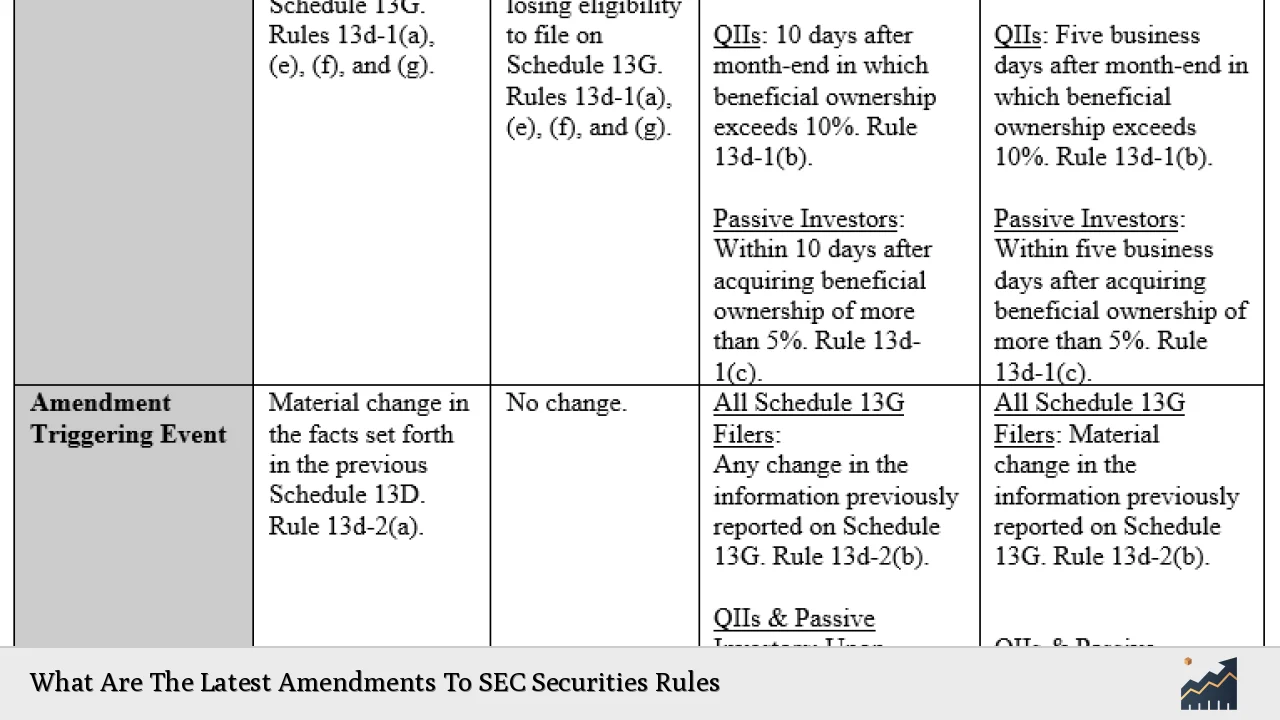The Securities and Exchange Commission (SEC) has recently implemented significant amendments to various securities rules aimed at enhancing market resilience, investor protection, and data privacy. These amendments reflect the evolving landscape of financial markets and the increasing reliance on technology, necessitating updates to existing regulations. This article provides a comprehensive overview of the latest amendments, their implications for market participants, and strategies for compliance.
| Key Concept | Description/Impact |
|---|---|
| Regulation S-P Amendments | Enhances data privacy protections, requiring firms to implement incident response programs and notify customers within 30 days of data breaches. |
| Regulation NMS Amendments | Introduces new minimum pricing increments and reduces access fee caps to improve market transparency and reduce transaction costs. |
| Clearing Agency Resilience Rules | Imposes stricter requirements on covered clearing agencies regarding margin collection and recovery planning to bolster market stability. |
| Form PF Revisions | Expands reporting requirements for private funds to enhance systemic risk evaluation by the Financial Stability Oversight Council. |
| Enforcement Actions Update | Reports a record number of enforcement actions in FY 2024, emphasizing the SEC’s commitment to ensuring compliance and protecting investors. |
Market Analysis and Trends
The SEC’s recent amendments come at a time when the U.S. economy is experiencing robust growth alongside low unemployment rates. As of December 2024, GDP growth remains strong, with inflation rates stabilizing. This economic backdrop affects investor sentiment and market behavior, leading to increased scrutiny of regulatory frameworks.
Current Market Statistics
- GDP Growth: Projected at approximately 3% for 2024.
- Unemployment Rate: Steady at around 3.5%.
- Inflation Rate: Expected to hover around 2% following a period of volatility.
These favorable conditions have prompted regulators to refine rules that govern market operations, focusing on transparency and investor protection.
Implementation Strategies
Firms must adopt proactive measures to comply with the new SEC regulations. Here are key strategies:
- Develop Incident Response Plans: Under the Regulation S-P amendments, firms should establish robust incident response protocols to address potential data breaches effectively.
- Revise Pricing Strategies: With changes in Regulation NMS regarding minimum tick sizes and access fees, firms should reassess their pricing structures to align with the new regulations while remaining competitive.
- Enhance Risk Management Frameworks: Clearing agencies must update their risk-based margin systems and recovery plans in accordance with the new SEC requirements.
- Training and Awareness Programs: Continuous education for employees about compliance requirements is essential to mitigate risks associated with non-compliance.
Risk Considerations
The implementation of these amendments introduces various risks that firms must navigate:
- Compliance Risks: Non-compliance with the new rules could lead to significant penalties and reputational damage.
- Operational Risks: Adjusting internal processes to meet new regulatory requirements may strain resources and disrupt existing workflows.
- Market Risks: Changes in trading practices due to amended pricing structures could lead to increased volatility in certain securities.
Firms should conduct thorough risk assessments to identify potential vulnerabilities associated with these changes.
Regulatory Aspects
The SEC’s amendments are part of a broader initiative to enhance the regulatory framework governing financial markets. Key regulatory aspects include:
- Increased Transparency: The new rules under Regulation NMS aim to provide clearer pricing structures and reduce conflicts of interest among market participants.
- Enhanced Data Privacy: The Regulation S-P amendments require firms to safeguard customer information more rigorously, reflecting growing concerns over data security in financial services.
- Strengthened Market Resilience: The new requirements for clearing agencies are designed to ensure that these entities can withstand market shocks, thereby protecting investors’ interests.
Future Outlook
Looking ahead, the SEC’s amendments signal a commitment to adapting regulatory frameworks in response to evolving market dynamics. Key trends likely influencing future regulations include:
- Technological Advancements: As financial technology continues to evolve, regulators will need to address emerging risks associated with digital assets and cybersecurity threats.
- Global Regulatory Harmonization: Increased collaboration among international regulators may lead to more standardized approaches in addressing cross-border investment challenges.
- Focus on Sustainability: Environmental, social, and governance (ESG) considerations are likely to become more prominent in regulatory discussions as investors increasingly prioritize sustainable investing practices.
Frequently Asked Questions About What Are The Latest Amendments To SEC Securities Rules
- What are the main objectives of the recent SEC amendments?
The amendments aim to enhance market resilience, improve investor protection through better data privacy measures, and increase transparency in trading practices. - How do the Regulation S-P amendments affect financial institutions?
Firms must implement incident response programs and notify customers within 30 days of any data breaches, which broadens their responsibilities regarding customer data protection. - What changes have been made under Regulation NMS?
The SEC has introduced new minimum pricing increments for certain stocks and reduced access fee caps, aiming to lower transaction costs for investors. - When do these amendments take effect?
The effective dates vary; for instance, compliance with Regulation S-P changes is expected within 18 or 24 months depending on firm size. - What are the implications for clearing agencies?
Covered clearing agencies must enhance their risk management frameworks by adopting stricter margin collection practices and developing comprehensive recovery plans. - How will these amendments impact individual investors?
Investors may benefit from improved transparency in pricing and reduced transaction costs as a result of these regulatory changes. - What should firms do if they fail to comply with these regulations?
Non-compliance can result in significant penalties; therefore, firms should prioritize compliance strategies and conduct regular audits. - Are there any anticipated future changes from the SEC?
The SEC is likely to continue updating regulations in response to technological advancements and changing market conditions, particularly concerning digital assets.
These amendments represent a crucial step towards ensuring that U.S. financial markets remain robust, transparent, and secure amidst ongoing changes in technology and investor expectations. As firms adapt to these new rules, they will play a vital role in shaping the future landscape of investment regulation.

